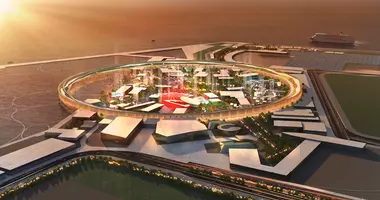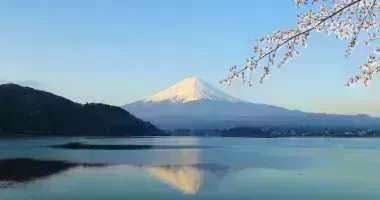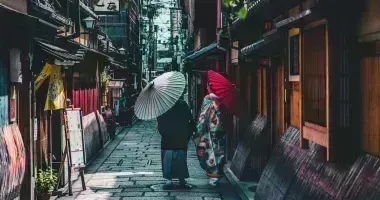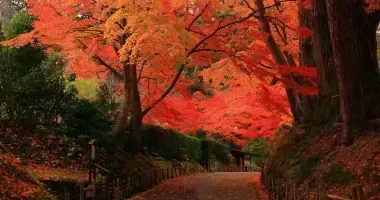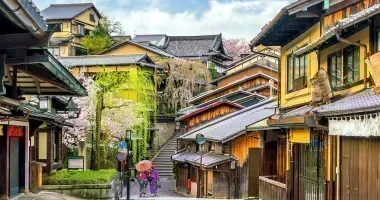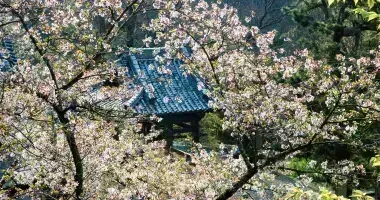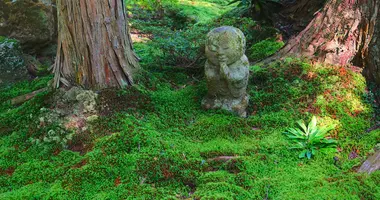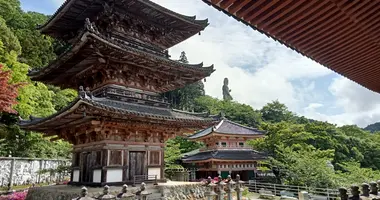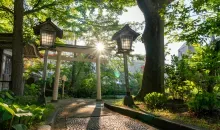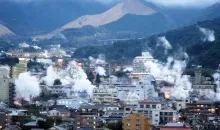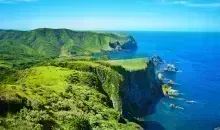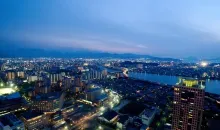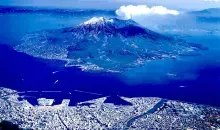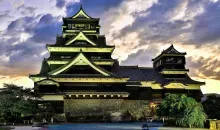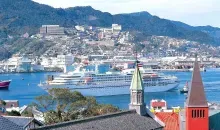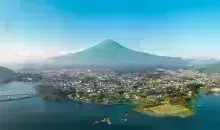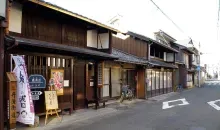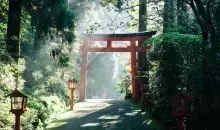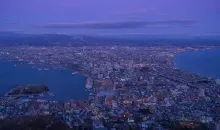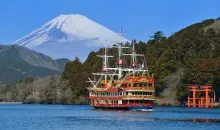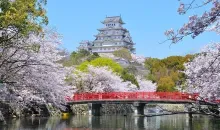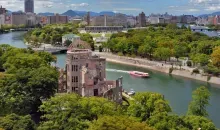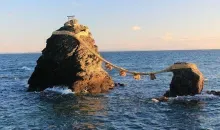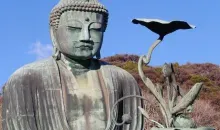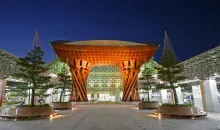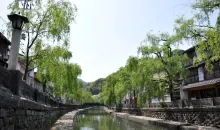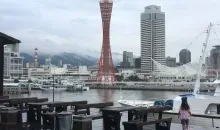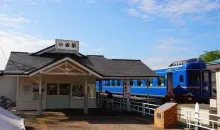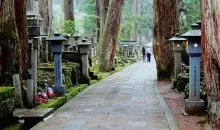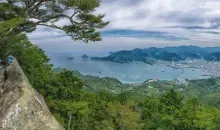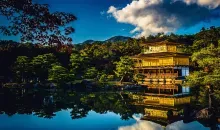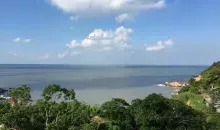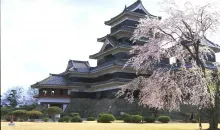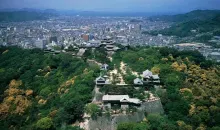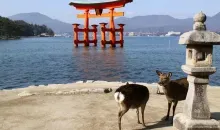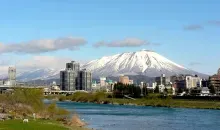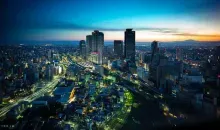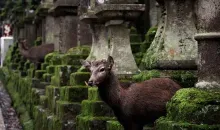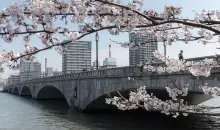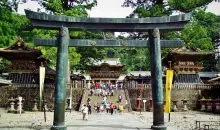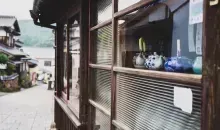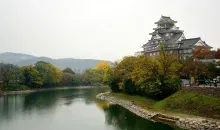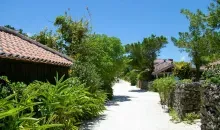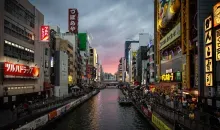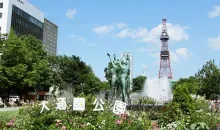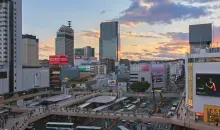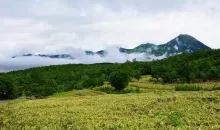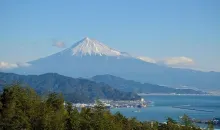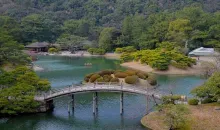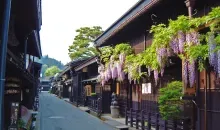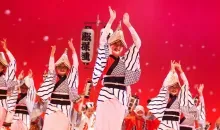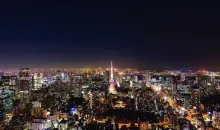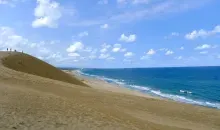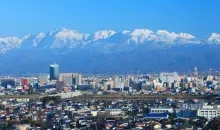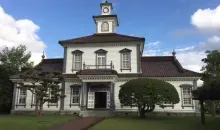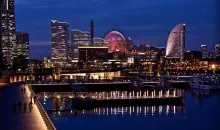Saitama 埼玉
- Publié le : 09/12/2020
- Par : EP
- Youtube
Heure locale 22:30
Symbol : sunny_cloudy
Temp : 32.7°C
Date : Aujourd'hui
Symbol : sunny_cloudy
Temp : 27.6°C
Date : Demain
Symbol : cloudy
Temp : 27.2°C
Date : Samedi
Symbol : sunny_cloudy
Temp : 28.7°C
Date : Dimanche
Heure locale 22:30
Symbol : sunny_cloudy
Temp : 32.7°C
Date : Aujourd'hui
Symbol : sunny_cloudy
Temp : 27.6°C
Date : Demain
Symbol : cloudy
Temp : 27.2°C
Date : Samedi
Symbol : sunny_cloudy
Temp : 28.7°C
Date : Dimanche
The city of Saitama, the capital of Saitama Prefecture is just north-west of the capital, Tokyo. Located in the fastest growing of Japan's prefectures, the city was formed in 2001 after the merger of the former cities of Omiya, Urawa and Yono.
Nearest Airport
Narita Airport (NRT) - 1 hour 10 minutes JR and Keisei Line
Haneda Airport (HND) - Limousine Bus 1 hour 13 minutes
Train Stations
Omiya Station (JR East and Tobu Urban Park Line)
Districts
Omiya - Bonsai Village and Hikawa Shrine
Urawa - Kenritsu Kindai Museum and many dining options
Saitama Travel Guide
Omiya City
Omiya is a major transportation hub and commercial center, located in the south east of Saitama Prefecture, situated just north of, but not directly bordering, Tokyo.
Omiya channels the daily flow of commuters heading into Tokyo from the vast suburban sprawl covering most of eastern and central Saitama Prefecture and provides those commuters with large-scale shopping and entertainment opportunities. In addition, it serves as a crucial transportation link between Tokyo and the north of Japan.
Saitama City
Omiya is not a city anymore, however. The former cities of Omiya, Urawa and Yono were merged in 2001, given the new name Saitama City and elevated to capital of Saitama Prefecture.
In the process of this restructuring, the former city of Omiya was split into four different wards of Saitama City.
Administrative decisions cannot overcome historically grown developments and local attitudes that easily, however.
The transport and commercial facilities of Saitama City are centered inside the borders of old Omiya while most of the prefectural government offices are located in Urawa. That makes for totally different traditions and outlooks - and the rivaling attitudes of the people in Omiya and Urawa resemble somewhat those between Osaka and Kyoto, albeit on a much smaller scale.
Saitama City has not so far built up any real civic identity. No local would say "I'm from Saitama City." or "I'm going to Saitama City." People say "I'm from Omiya" or "I'm going to Urawa."
Reflecting the historical importance of Omiya, the license plates for all cars registered in Saitama City still read 大宮 (Omiya).
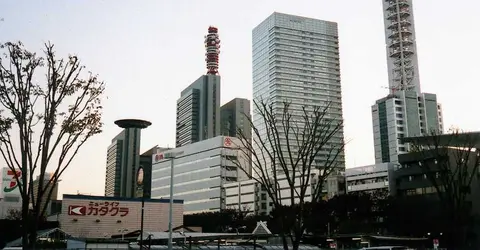
Shintoshin East - Saitama City
Photo by Gakujin - 自分で撮影, CC BY-SA 3.0, https://commons.wikimedia.org/w/index.php?curid=5592533
Omiya Station
Omiya Station is the contemporary heart of the city. Omiya Station is served by several shinkansen lines (including the Hokkaido, Tohoku, Joetsu and Hokuriku Shinkansen) as well as by several important JR commuter lines including the Shonan Shinjuku and the Saikyo lines, running the heart of Tokyo to Tokyo Bay and beyond.
More locally based lines serving Omiya Station are the Tobu Park Line and the elevated New Shuttle.
Omiya Station is very busy especially during rush hour. In fact it is one of Japan's busiest stations in terms of people passing through.
However, since most of the train lines belong to only one company, JR East, the station is relatively easy to navigate even for first time visitors.
In the very center of the station you will find a city information booth. The staff there have free city maps available in multiple languages and are very helpful in pointing out the way to your destination.
Leaving the station through the West Exit, you will head right into the commercial heart of Omiya. Tall buildings housing department stores, huge screens on their exterior walls flashing videos of the latest J-pop groups. It feels a bit like a toned-down, suburban copy of Shinjuku geared towards people stopping by on a short transit, quickly buying something on their way home further out in the 'burbs.
The East Exit of Omiya Station leads to a few small lanes of more traditional eateries and izakaya restaurants. Heading out of the East Exit is the best way to explore Omiya by following its historical trajectory.
Things to do and see in Saitama
Omiya History and Hikawa Shrine
Omiya translates as "big shrine" and a big shrine it is the city has been named after - Hikawa Shrine.
Hikawa Shrine is the main shrine of a nation-wide Shinto shrine group dedicated to Susa-no-Oo, the famously unruly god of the winds and the seas.
As it goes with such traffic hubs, they need to constantly modernize to stay relevant. Omiya did just that - but in the process unfortunately disposed of most of its historical quarters, save for Hikawa Shrine and its environs.
For many centuries, the Hikawa Shrine was the main Shinto Shrine of Musashino Province, covering most of today's Saitama Prefecture. This is reflected in the full name of the shrine: Musashino Ichinomiya Hikawa Shrine, which translates as "Number One Shrine in Musashino - Hikawa Shrine".
Hikawa Shrine and the pilgrims it attracted, as well as the location of the shrine on the Nakasendo, a popular inland alternative to the more coastal Tokaido, connecting Kyoto with Edo (the old name for Tokyo), made Omiya a traffic and business hub centuries ago during the Edo period.
Visit of the shrine
Walking straight east after heading out of the East Exit of Omiya Station, you soon hit Hikawa Sando Dori. That's the old access road to Hikawa Shrine - a long, straight pedestrian road lined by a park-like stretch of ancient trees. It was this road the dignitaries of yore used to approach the shrine, traveling through a number of still extant torii gates signaling that you are about to enter very holy territory.
You still get the same feeling walking the road today though it's rather tourists and pensioners with their dogs than historical priests and samurai you are going to encounter on the way.
Hikawa Shrine itself is an impressive structure dating back to about 500 B.C. The history of the shrine that is, not the buildings to be seen today. The current buildings were erected in the 1940's though clearly modeled on earlier versions of the shrine.
The main compound of the shrine, entered through the artfully carved red Romon Gate, houses the honden (main shrine), haidan (prayer hall) and a stage for kagura (ritual dance performances) and other festivals.
Outside of the main compound you find a good number of smaller auxiliary and sub-shrines, belonging to local families or other Shinto shrine groups (a small Inari fox shrine, for example), situated in lush greenery, partly centered around a small pond.
Though relatively quiet for most of the year, Hikawa Shrine gets very crowded for the celebrations of New Year's Eve. At that time, NHK reports live from here minutes before midnight.
- Address: 1-407, Takahana-cho, Omiya-ku, Saitama-shi
- Access: 15 minutes walk from the East Exit of Omiya Station
Omiya Park
The park-like environs of Hikawa Shrine extend into adjacent Omiya Park. The park is certainly worth a stroll.
It features a small Japanese garden, a little zoo, a children's playground and, next to the park's pond, two small eateries.
Except for the Japanese garden, all the park amenities look like straight out of the 1960's.
So, if you feel like seeing a still surviving pocket of Japan in the times when the introduction of the first shinkansen was in the news, Omiya Park is a good place to go. The structures there have all the melancholy of washed-out concrete and half-abandoned attractions that time forgot.
Omiya Park is also home to the Saitama Prefectural Museum of History and Folklore.
Today's Saitama Prefecture largely covers the ancient Musashino Plain, the flatlands north of old Edo. Though most of old Musashino is covered by suburban sprawl today, the area is very rich in history. The museum tells amazing historical stories both via its permanent collection and the changing special exhibitions.
- Address: 4-219 Takahana-cho, Omiya-ku, Saitama-shi
- Access: The closest train station is Omiyakoen Station on the Tobu Noda Line.
- Opening hours: 9am to 4.30pm (open until 5pm in July and August), closed on Monday.
- Admission: General exhibition: Adults 300 yen, children 150 yen. Special exhibitions: Adults 600 yen, children 300 yen.
Bonsai Village
Cross the park and the Tobu rail line behind it and you find yourself in Bonsai Village. It's a very green area with great gardens outside almost every house. It looks somewhat upscale but the lush green of the area might have to do more with the history of the area than the affluence of its residents.
After the Great Kanto Earthquake in 1923, many of Tokyo's bonsai tree gardeners moved out here. The area had just the right soil conditions for their trees and after the destruction the quake caused in Tokyo, this seemed to be a good place for a new start.
More than 30 bonsai nurseries started out here at the time, making Omiya Bonsai Village the center of bonsai culture in Japan.
The number of bonsai nurseries is down to about 10 today. All of them are open to the public and visitors are very welcome. You will find a great variety of bonsai trees on display and the staff are happy to answer all your questions about them.
The nurseries are also great places to actually buy bonsai trees and to get detailed information on how to take care of them.
Maps showing how to get to the various bonsai nurseries are displayed throughout Bonsai Village. The maps are in Japanese but are very easy to understand even if you can't read the language.
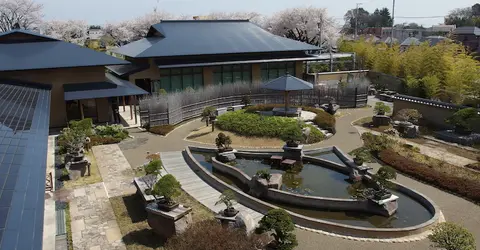
Omiya Bonsai Art Museum, Saitama
Photo by Guilhem Vellut - Flickr.com - CC BY 2.0 - https://creativecommons.org/licenses/by/2.0/
Omiya Bonsai Art Museum
Located right inside Bonsai Village is the Omiya Bonsai Art Museum. The museum, which opened in 2010, is the first public museum focusing exclusively on the art of bonsai tree growing.
Plenty of information on the history of bonsai is provided here and the exhibits are stunning. Especially the bonsai garden in the back of the museum, featuring hundreds of masterpiece bonsai trees.
Omiya Bonsai Art Museum also organizes international bonsai conferences, exhibitions and the like. By now, it has established itself as the center of serious bonsai culture. For anyone with a serious interest in bonsai, visiting or getting in contact with the museum is a must.
- Address: 2-24-3 Toro-cho, Kita-ku, Saitama-shi
- Access: 5 minutes walk from the East Exit of Toro Station on the JR Utsunomiya Line, 10 minutes walk from Omiyakoen Station on the Tobu Noda Line.
- Opening hours: March to October 9am to 4.30pm, November to February 9am to 4pm. Closed on Thursday (except for National Holidays), from December 29th to January 3rd and for periods of exhibition preparation.
- Admission: Adults 300 yen, High School and University Students and persons over 65 years old 150 yen, Elementary and Junior High School Students 100 yen.
Japan Mint Museum
The Japan Mint Museum moved from Ikebukuro in Tokyo to Omiya in 2016. There are exhibits on the history of coins in Japan as well as modern production procedures. The museum is located about 10 minutes' walk from Saitama Shintoshin Station.
Railway Museum
It's about a 15 minute walk from Bonsai Village to the Omiya Railway Museum - and its worlds apart.At the Railway Museum, Omiya focuses on what it always has been done best - serving as transportation hub - a rail transport hub, in fact, for the past century.
The Railway Museum offers everything a dedicated railway fan can hope for - and more. On the first floor, you find a gigantic display of original historic locomotives and rail carriages, covering the whole time span from early steam locomotives to electrified trains of the 1960's.
Many of the train carriages and some of the locomotives can be entered.
One historic steam locomotive has been cut open to allow a peek into its inner workings. No, that front part of a steam locomotive is not just a big water tank - it houses a complex system of pipes and machinery converting the coal-fire-induced heat into the incredible power that powers the locomotive pulling a multitude of heavy rail cars uphill.
If you want to learn more about that, the museum offers plenty of learning areas on its upper floors that explain the details - often providing hands-on experience on how things work the way they do.
On the second floor, a detailed exhibition covers the history of rail traffic from its beginnings in Britain in the 1820's up and its start in Japan in the early Meiji Period to the shinkansen bullet train of the 21st century.
The lines are usually rather long at the simulators that give you a realistic insight on how it actually feels driving a locomotive (yes, a steam locomotive is included - and it is the most popular).
What about some actual train spotting? The rooftop observation deck of the museum offers exactly that. From there, you have an excellent view towards the neighboring elevated track of the shinkansen trains heading north with the elevated New Shuttle tracks running parallel to them. Wait a few minutes and a shinkansen will zoom by.
Looking down you see the tracks of the Saikyo Line amidst other rail lines. You are literally surrounded by real-life railway systems here - on an island amidst train tracks.
But looking below, you also discover some very small trains that seem to belong to the museum. They do, in fact, and a few flights of outdoor stairs get you right there.
The mini train system of the museum, geared primarily to children, allows visitors to drive their own little trains - under the supervision of trained staff, of course. A mind-blowing experience for most 10-year-olds to be sure.
Close to the mini train setting you find an ekiben stall serving classic Japanese train station bento like yakisaba sushi (fried mackerel on rice).
The best place to eat the ekiben is a train of about 1970's vintage parked right next to the ekiben stall. Dubbed the Friendly Train, the parked train has tables in front of all seats and a general design that can still be found on rural railways today. You feel like sitting in a real, if somewhat nostalgic train, eating your sushi while real Saikyo Line trains rush by on the busy tracks just a few meters away.
- Address: 3-47 Onari-cho, Omiya-ku, Saitama-shi
- Access: Situated right next to the Tetsudo Hakubutsukan Station of the New Shuttle.
- Opening hours: 10am to 6pm, closed on Tuesday and the New Year holidays.
- Admission: Adults 1,000 yen, Elementary, Junior High and High School Students 500 yen, children 3 years and up 200 yen.
Access - Getting to Saitama
By Train
Omiya Station can easily reached from Tokyo Station on the Shinkansen in 25 minutes, the JR Takasaki Line in 31 minutes and the JR Utsunomiya Line also in 31 minutes.
From Ueno Station to Omiya Station on the Takasaki Line is 26 minutes.
From Ikebukuro Station a JR Saikyo Line Rapid train for Kawagoe takes 25 minutes to Omiya Station. From Shinjuku Station to Omiya Station is 30 minutes on the JR Saikyo Line and 32 minutes on the JR Shonan-Shinjuku Line.
New Shuttle
The Railway Museum has its own stop on the elevated New Shuttle Line of Saitama New Urban Transit. Named Tetsudo Hakubutsukan (the Japanese name of the Railway Museum), it is located only one stop from Omiya Station.
The New Shuttle is a rubber tire railway system, often called a people mover, and frequently found in the form of airport shuttles. It's rather unusual to find it employed as commuter rail system serving city traffic. But that's what it does in Omiya / Saitama City.
Omiya always seems to try to stay on the cutting edge. If you want to catch up with the future of urban transit, Omiya might be a good place to keep in mind.
Travel to Saitama (through Omiya Station) with a Regional Japan Rail Pass
Intéressé par Saitama
Découvrez d'autres villes à visiter






